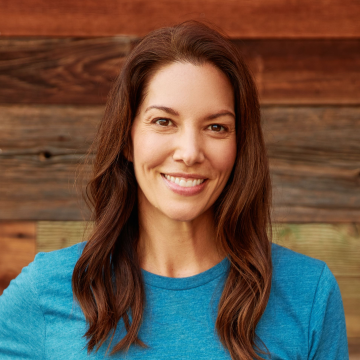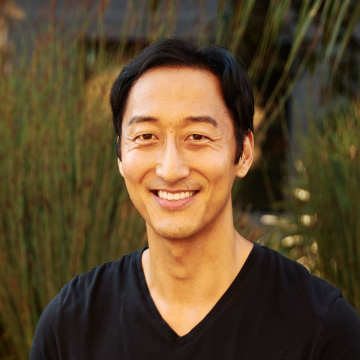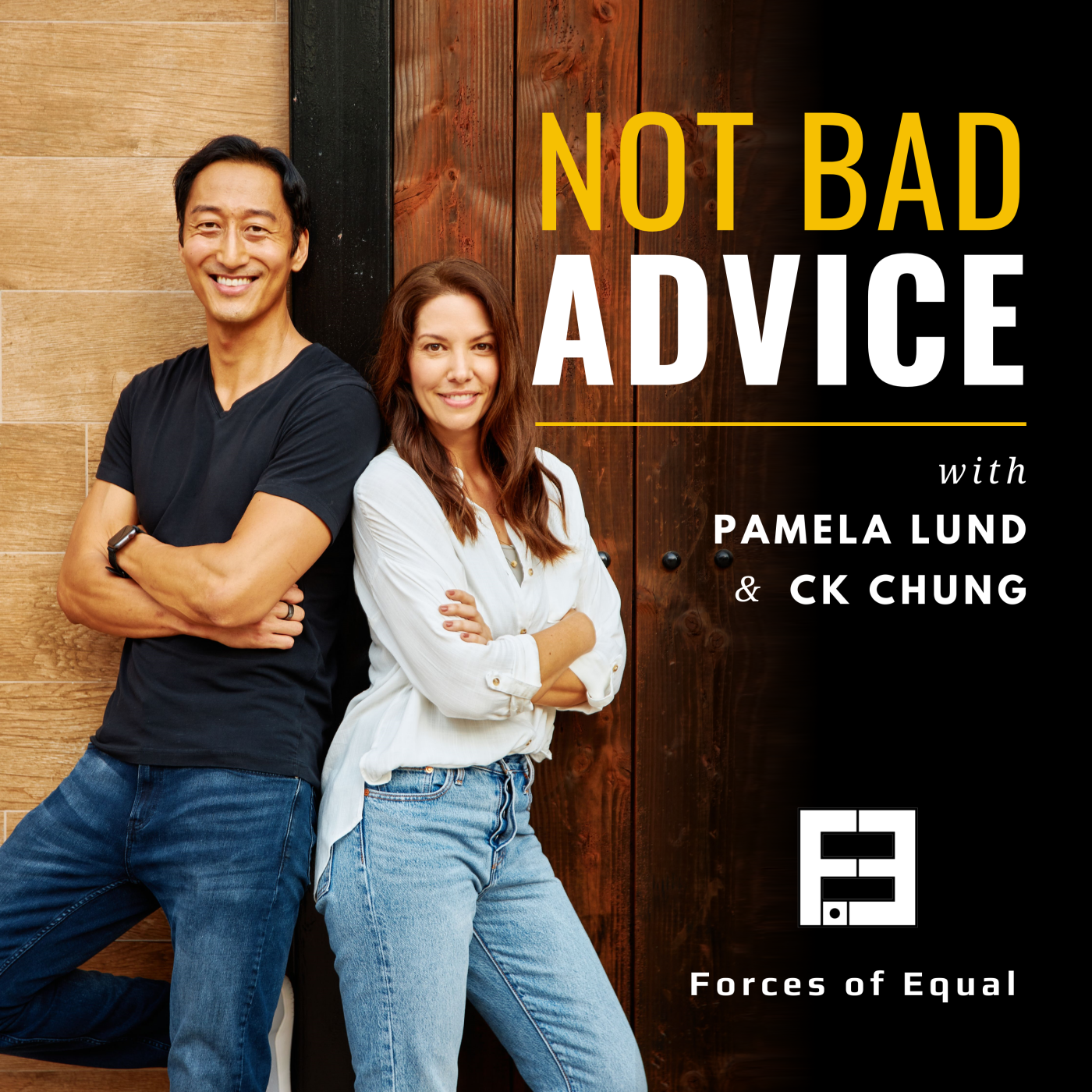Do that thing you’ve always wanted to do, that thing that scares you and excites you. Write the book. Start the business. You might fail, you might succeed, but you’ll never know if you don’t try.
I’m doing the thing that scares and excites me by creating this show. Subscribe so we can become better together. In each episode, we’ll help you become more mindful, happier, and meaningfully productive.
Need advice about something? Ask us here: https://forcesofequal.com/advice/
Transcript
Pam: [00:01] You’re listening to Not Bad Advice where we discuss one good idea that you can use right away, no matter who you are or where you’re at.
[00:19] We cover topics all over the spectrum with the simple goal of offering you a new perspective. I’m Pamela Lund.
CK: [00:25] And I’m CK Chung.
Pam: [00:27] And we hope that after listening, you’ll think, “Hey, that’s not bad advice!”
[00:38] This is the inaugural episode of Not Bad Advice – a show that has really been a lifetime in the making, even though the actual idea for the show only came to me a few weeks ago. CK and I took this show and a few other creative projects under our umbrella brand, Forces of Equal, from idea to launch very quickly.
[00:58] We just decided to start creating things that we wanted to share with the world without knowing what the end result would be. And that’s exactly what I want to talk about today. That you don’t have to have a complete vision or a concrete business plan or perfect circumstances to start something new.
[01:15] If you wait for those things, chances are, you’ll never start. So CK, you are really the driver behind this shift for us. When you launched another podcast called Practice with CK, what was the impetus behind that?
CK: [01:29] Well, somewhat complex. There’s a lot of different factors.
[01:34] So one of them was just my fascination with podcasts. I’m subscribed to over 200 and I listened to podcasts 15 to 20 hours a week, if not more. And we’ve both been mulling around the idea of starting our own podcasts for the past few years. So the interest in podcasts and wanting to start my own was one of the factors.
[01:59] And then also I want to learn how to converse better and be better in speaking and talking and conversation so that I can be more articulate with my thoughts and be more present in conversations. And also just the whole notion of practice and learning from the experience, and progressing incrementally. And putting myself out there.
[02:30] And, you know, it had to do a lot with how I want to assert my self and my knowledge and my identity, but also be in tune with the systems outside of myself and society and friends and acquaintances and whoever I’m talking to. So, yeah, it was just a combination of a bunch of things and me wanting to improve myself.
Pam: [02:56] So, did you have any idea what the end result was going to be that first day that we recorded? Or was it a spur of the moment decision?
CK: [03:06] Yeah. I mean, of course the goal was to improve with speaking and figuring out this whole podcasting stuff and be able to produce a good podcast. But yeah, I mean, I didn’t really have any solid goals or ideas of where things would be going from doing a podcast.
Pam: [03:27] And could you have envisioned how far you came in the last two months from day one to the eighth episode that we recorded and all the changes that have happened for you in that time?
CK: [03:37] No, not even close. And I’m still processing all the progress that I’ve been making, and it’s just been like a force multiplier for me. And it’s infiltrated all the other projects and pursuits that I’ve been making, and just improved everything overall across the spectrum.
[03:56] So yeah, I’m still trying to figure out what it is that went into it and why I’m so motivated and productive now. But yeah, there’s definitely something with this whole process. that’s kind of catalyzing everything else. It’s crazy.
Pam: [04:13] That’s great. So I think that’s one of the big messages here is that the great things that we do in life, we look back and we didn’t know they were going to be great when they started. You don’t go on a first date thinking that you’re going to marry that person. Or when kids start playing musical instruments or sports, they don’t go into it with the intention of becoming professionals. That would put way too much pressure on the beginning of whatever it is.
[04:43] But we put that pressure on ourselves with other things in our lives. So if you want to be a writer, every day, maybe you think about how you need to write a book. So you put all of this pressure on yourself to write a book, and then you get paralyzed with that big goal of writing a book. So then you don’t write anything.
[05:02] Or maybe you have a business idea that you talk about to all your friends and it makes you feel alive when you talk about it, but you don’t exactly know how you’re going to take it from the idea to, you know, being your full-time job or even making money maybe. So you never pursue it because you get stuck in that, like, what’s the end goal for this going to be.
[05:22] So you never start because you’re so paralyzed on the end result. And building a business or creating art or anything like that, it’s not like building a house. You don’t have to have a perfect blueprint to start. You know, you don’t need to know where the bathroom is going to be.
[05:40] It’s not, it’s not like that. So if you’re waiting for things to be perfect, they’ll never be anything. You can get stuck in this planning mode as a defense mechanism, because you’re scared or you have all of this pressure on yourself to create something great. So my advice here is to just start. To try to adapt and adjust and be flexible.
[06:10] And don’t think about what is this going to be at the end? Where does this have to end up? I want you to think about what you could do if you didn’t need to know how something ends. Like, what if you just start out doing something that makes you happy. Can that be enough for you to start?
[06:36] And one of the big principles that helps me is the principle of “yes, and.” Using that framework in your life saying, “yes, I’m scared, and this will make me happy” or “yes, this is imperfect, and I can do it anyway.”
[06:55] So if you use that, if you can find the duality in your situation, then using “yes, and” can really help you get over whatever the yes is. You know, “yes, this is the situation, and this other thing can also be the situation.”
CK: [07:11] Yeah, that’s great. I like that. So it allows you to recognize what’s holding you back. That big picture end goal that’s occupying your mind. Saying yes, that is there and that exists allows you to recognize that. But then the end of that, and reflecting on other aspects or other perspectives can help you get out of that single track mindset of that one big picture end goal and help you see things in a expanded perspective.
Pam: [07:45] Yeah, I like that. It could be, “yes, I want to write a book, and I can start with the chapter today.”
CK: [07:52] Yeah.
Pam: [07:53] That’s good. So it’s great to have goals and goals give you direction when you’re starting new things, but you can’t expect to know exactly where you’re going to be in five years or have a perfect roadmap for how you’re going to grow when you start this new thing.
[08:11] I think that’s been really one of the amazing things that has come out of the last two months since you started Practice with CK, which is that we’ve changed so much and we’ve learned so much in that short period of time, simply from doing. And you’re going to learn so much once you just start the practice of doing whatever it is.
[08:33] And when you go through that change, when you learn new things, when you become better at what you’re doing, when you develop new processes… all of those things change your trajectory. So if you had this really focused single outcome goal in mind, you can become too focused on that and you can miss opportunities that come along as you’re doing whatever it is – whatever you’re trying to build. Or you don’t appreciate what you’re learning, because you’re so focused on this other path.
[09:07] Or you end up going down that path and you haven’t done the groundwork to make it successful. You didn’t learn all of the things that you need to learn to get to that end goal, because you jumped right from start to finish and you didn’t go through this process of discovery and of learning.
[09:26] And you may even just like start and find out that that big goal that you think that you are going after isn’t actually the goal that you want anymore because you’ve learned so much and you have discovered something new through the process of doing.
[09:40] So if you have this huge goal that you’re working towards, try not to be too focused on that. You don’t need to have that be the only thing. You can stay in the day-to-day practice, the process of learning and doing. And doing small pieces and just see where that takes you.
CK: [10:03] Yeah, that makes a lot of sense. It’s like, if you are too hyper-focused on that end goal, that big picture, you get too narrow-minded and you get rigid in your process. So even just the process itself can broaden your perspective on how you’re going about things. And like you said, you know, as you’re going along and you’re producing, your outlook can change and therefore, you know, you’ll adapt and you’re a goal at the end may be different from what you started out with.
[10:37] So, yeah, I also like how you said that, you know, you should ask yourself, what would you do if you didn’t need to know how it ended? And on top of that, what if it starts out as just something that makes you happy?
[10:51] And I think that’s a big factor that you need to consider because also a lot of times, if you’re just hyper-focused on that end big picture goal, you lose sight of the reasons why you’re pursuing that.
Pam: [11:05] I think that’s a great point.
CK: [11:06] And so if you think about the process and how the process makes you feel, and if the process is making you feel fulfilled or challenged, and then you can adapt throughout the process and eventually figure out how to get to the end or what that end goal needs to be, or how that should change, rather than have like a rigid, hyper-focused goal that may end up making you unhappy during the process.
Pam: [11:36] I like that. I like the idea of framing the goal as feeling or not necessarily like I want to build a business, but I want to have a business that makes me feel fulfilled, and staying on that path of checking in with yourself and saying, “is this making me happy? Is this what I want?”
[11:58] Rather than being so singularly focused on making money or building a certain kind of company. Staying really in tune with what you’re feeling as the process goes on.
CK: [12:08] That makes sense.
Pam: [12:10] So I think that’s a good time to transition into the part of the show where we get a little more intuitive with our advice. So I’m going to shuffle a deck of Oracle cards and I’m going to pull a card to see what perspective we can get. Maybe it will easily relate to what we discussed today. Maybe it won’t. None of this is planned or scripted. It’s just an offering of advice from the universe.
[13:00] So Oracle cards don’t predict outcomes or tell the future. They don’t tell anything. They invite us to think about things differently. They simply offer perspective. So even if you’re not into the idea of intuition or wisdom for the universe, stick around, you don’t have to believe in any of it for the message to have meaning.
[13:20] Like any of the advice we give here, all you have to do to benefit is listen, see what resonates for you and apply it to your life. So today we’re using the nocturnal Oracle deck. It’s designed by Megan at the creeping moon. And as the name implies, these cards feature mostly plants and creatures that are nocturnal or active at night or things that we associate with nighttime.
[13:44] Interesting. That’s a beautiful deck. I love the gold on the edges and illustrations. So we’ll start posting photos of these on Instagram. Okay. So let’s see what the cards have for us today. Yeah.
[14:07] Okay. So I pulled the snow card. And if you grew up in the Midwest, like CK and I did, you know what a fresh blanket of snow is like. You walk outside in the morning and everything is quiet. Everything is calm. And there’s not a lot of movement. There’s not a lot of activity going on. It’s calm, it’s solitude. It’s fresh and new.
[14:37] So, for me, this card is telling us today to be quiet, reflect, think about what could be fresh and new. Think about if you take a step back from the noise of your life. If you can take some time away from the email and notifications and texts and social media and all of the noise that we have around us at all times, all of the distractions, all of the things that we’re bombarded with.
[15:26] If you can take a step away from that and find some quiet. Find some peace and reflect, see what comes up for you. See what new messages come through for you. See what new insights, new ideas, new things that you want to start. See what comes up and see if there are things that you want to start without knowing what the end goal will be.
CK: [15:58] That’s perfect.
Pam: [16:00] So, if you found yourself thinking, “Hey, that’s not bad advice” while listening today, we’d love it if you share the episode with your friends or on social media. You can tag us on Twitter where I’m @Pamela_Lund, and CK is @cKdisco.
[16:17] To find us on other platforms, visit ForcesOfEqual.com/Advice. There, you can also contact us if there’s something you need advice about. We’d love to hear from you.






